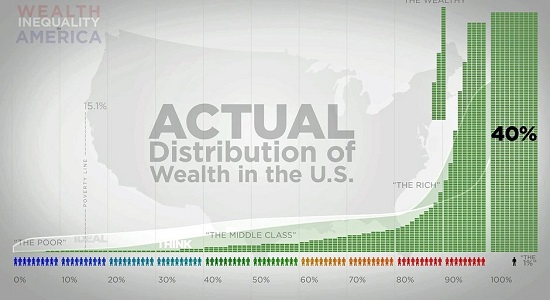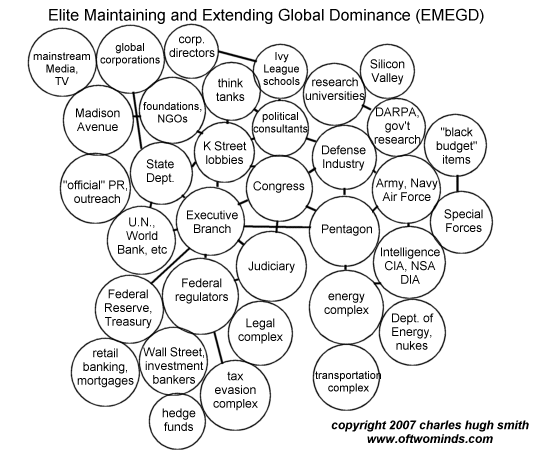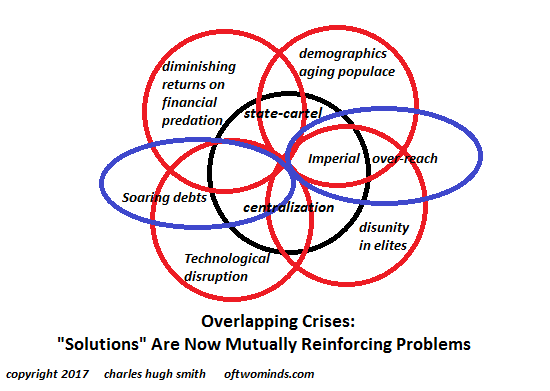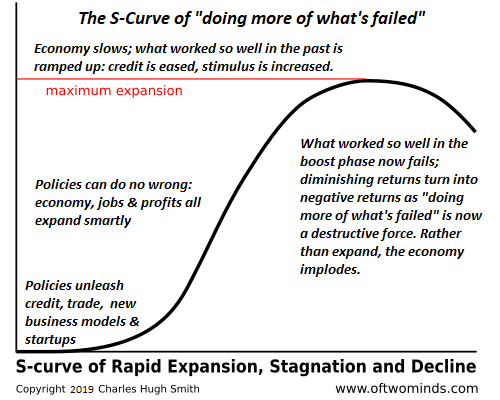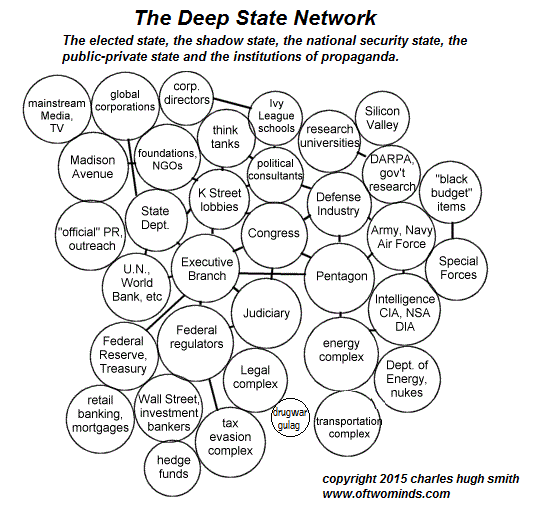Many call the idea that there's a Deep
State a “conspiracy theory”. But is this automatically the case? Don't we
need good reasons as to why it's so? Is the idea impossible in principle? And
doesn't it all depend on precisely what's said about the Deep State?
For example, the notion of a Deep State can include a vast
conspiracy behind closed doors. Alternatively (or perhaps in conjunction), it
can simply be about (among other things) what I call Gramscian/Alinskyite institutions and the consequent conspiring which
undoubtedly occurs when institutions (or their members) share a political
ideology and/or political causes and goals.
It seems bizarre, anyway, that the idea of a “deep state” (or
“shadow government”) is automatically deemed a conspiracy theory when (according
to one definition, at least) all it means is that there are individuals and
institutions, which are separate from -- and independent of -- the government;
but which, nonetheless, have political power. However, the additional belief
that such a state “is the real government” (or “really holds all the power”)
is, I think, a little too extreme. Moreover, it's also over-the-top to believe
that the actual government is a “puppet” (an Internet cliché) of the Deep
State. Perhaps it's simply the case that the Deep State and the actual
government share power in some -- or in many -- ways.
In the end, it depends entirely on what's said about the/a Deep
State and who and what is supposed to constitute it. The claim that the Jesuits
or the Vatican run the Deep State may be true or false. Alternatively, the
idea that globalists and transnational corporations run the Deep State may make
much more sense that claiming that alien lizards do. (Other contenders for the
Deep State -- and the list is long -- include the World Bank, the Bilderberg
Group, the Council on Foreign Relations, the Trilateral Commission, the CIA and
MI6, the Illuminati, the writers of “The X-Files” and so on.)
Trump and the Deep State
There's no denying the fact that the term Deep State has been used
many times. For example, Stephen Bannon, according
to the Washington Post,
"has spoken with Trump at length about his view that the 'deep state' is a
direct threat to his presidency”. The specifics of this claim refer to Obama organizing
a resistanceagainst Trump. (This is includes the claim that Obama
wiretapped Trump's telephone.) If these claims are taken to be true; would they
constitute the workings of a Deep State?
Many media people say that the idea of a Deep State is “popular
with Trump and his supporters”. The implication (though it's sometimes stated)
here is that other groups and individuals haven't and don't believe in a Deep
State. Perhaps, in the end, all that's meant is that Trump and his supporters
use the words “Deep State”, which has only recently come on the scene. Here,
then, we need to make a distinction between the concept [deep state] and the
words “deep state”.
So let's go all the way back to 1922 and read the words of
Democrat John Hylan, the former mayor of New York:
"The real menace of our Republic is the invisible
government, which like a giant octopus sprawls its slimy legs over our cities,
states and nation."
The Term 'Deep State'
Let Mike Lofgren (a former U.S. Congressional aide) define the term 'Deep State' (as he did in 2014):
"[A Deep State is a] hybrid association of elements of
government and parts of top-level finance and industry that is effectively able
to govern the United States without reference to the consent of the governed as
expressed through the formal political process."
This is problematic. Does a Deep State actually need to “govern” a
country in order to be a Deep State? I suppose that if the Deep State truly is
a state, then perhaps it must. Then again, this definition ignores the classic
distinction between state and government; which has been emphasised by many
political theorists. Certainly courts, lawyers, police chiefs, civil servants
of other description, etc. have much political power without actually
governing. Indeed, the civil service keeps its position when the government
changes.
The state is said to include (over and above my own examples) the
armed forces, intelligence agencies, administrative agencies and other branches
of governmental machine. These are free of the public vote.
All the above can resist the government. They can obstruct the
government. And they can even subvert the government.
In the case of Mike Lofgren's example above, “top-level finance
and industry” are cited. Why only finance and industry? Why not the courts,
judges, lawyers, non-governmental organisations (NGOs), etc.? It's interesting
that Leftists also concentrate on big business and finance when it comes to the
Deep State; though they largely ignore the courts, lawyers, professors, NGOs*,
etc. (That's because the former are seen to be politically incorrect and the
latter are often seen to be politically correct.) In addition, Mike Lofgren
can't be denying that industry and finance have a profound influence on
government. But do they govern?
The examples of a Deep State (especially the ones given by Trump
and his supporters) are said not to justify that term because they're not deep
enough (i.e., not organised and centralised enough) to warrant that term. In
addition, Deep States are primarily concerned (it's said) with quelling
dissent. Trump's critics will claim that this ain't happening in the cases
cited by Trump and his supporters.
What About Gramscian/Alinskyite
Institutions?
One will note that left-wing institutions and individuals are
rarely deemed to be part of a Deep State -- at least in the Trump era. Why is
that? It may depend on what a Deep State is taken to be. It may even be the
case that a Deep State is defined explicit and intentionally to exclude all
left-wing institutions.
This is where Antonio Gramsci and, three/four decades later, Saul
Alinsky enter the picture.
The Gramscian idea is fairly simple. No government can rely
entirely on what Gramsci himself called “coercion” to uphold its position and
power.
It was the state which was responsible for the ‘coercive’ part
(i.e., the army, police, secret service, etc.) of the Gramscian equation.
However, the state could never rely entirely on force (or coercion) alone.
Gramsci argued, instead, that a “network of institutions” (this
phrase implies either tacit or explicit cooperation between institutions)
enjoys a certain degree of independence from the government. From that
position, such institutions can propagate the ideas and values of the ruling
state.
So what “institutions” was Gramsci talking about? Primarily
Gramsci had in mind the media, the education system, the universities, the
legal profession/s, the courts, voluntary organisations and even the Church (or
churches).
Now for Saul Alinsky.
This man never only had eyes for inner-city blacks and the working
class. He believed that radicalising the middle-class was just as necessary as
radicalising blacks. Without the help of the later, the radicalisation
programme would never have worked. Alinsky wanted the bourgeoisie to become
politically active. He -- like Gramsci some four decades earlier -- feared
that the middle class would otherwise adopt fascism at the drop of a hat, which
is a very common Marxist refrain. (As stated by Alinsky in a Playboy interview, March 1972.) Consequently,
it was then time for Alinsky to become a Gramscian.
Sure, these Gramscian/Alinskyite institutions may not have as much
direct power and money as Mike Lofgren's “top-level finance and industry”.
Nonetheless, they have immense intellectual/propagandistic power (e.g., many
university departments) and also political power; if, as it were, further down
the line.
The other point is that notions of the Deep State (as well as
Marxist notion of “hidden state power”) have focused on the military, police,
finance and big business. Gramsci himself believed that there are many
other players in the game.
For example, it was the courts and lawyers of the European Union
and the United Kingdom which/who declared war on Brexit. The courts and lawyers
have also declared war on Trump in the United States. You can also add to
universities/university departments, those who run “sanctuary cities”, the
Soros-Black Lives Matter alliance, NGOs, etc. to that list. Whether all these
examples can be deemed to be part of a Deep State is debatable. Nonetheless,
they all hold huge political power. In addition, they all completely ignore the
will of the majority of the people as it is expressed through the voting
system.
Take these powerful left-wing and Islamic NGOs:
The Clinton Foundation (US), Amnesty International, Human Rights
Watch (funded by Soros), Refugees International, American Muslims for
Palestine, CAIR, Electronic Intifada, International Solidarity Movement, the
Runnymede Trust (UK), Southern Poverty Law Center (US), Hope Not Hate (UK),
Tell Mama (UK), Black Lives Matter (US), American Civil Liberties Union, Liberty
(UK), the Muslim Council of Britain (MCB), Greenpeace, Friends of the Earth,
Democracy International (US), Black Radical Congress (US), the Occupy
Movement....
Some people may quibble and say that not all the above are NGOs.
However, they all have varying degrees of political power.

